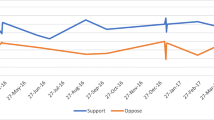
Overview
- Presents a multidisciplinary approach
- Examines why the dominant neoliberal paradigm resulted in the surge of national populism
- Shows why there is a need for a dialogue on human rights and globalization in this era of populism
Access this book
Tax calculation will be finalised at checkout
Other ways to access
About this book
This book offers a comprehensive and multidisciplinary global overview of populism and human rights in the light of globalization. It examines why the dominant (neo)liberal paradigm of the last decades resulted in major economic and social inequalities which resulted in the surge of national populism, led by the election success of right-wing parties, movements, and leaders across the world. It discusses, among other topics, the success of Brexit in Britain and the election success of Donald Trump and Marine Le Pen and explains why there is a need for a dialogue on human rights and globalization in this era of populism.
Further contributions analyze various important topics of the field, including cross-culturalism, globalization, human rights, challenges and threats, diversity, curbing global corruption, sustainable development, populism, the decline of free speech, the new nationalism, internationalization, global regime of human rights, leadership theory, global management competencies, gender, quality management, individualism-collectivism, and examples of new initiatives in global organizations. This makes the book a valuable and useful resource for students, researchers, and scholars of international relations, political science, sociology, political psychology, law, diplomatic studies, Communication and media studies, economics, education and management, as well as practitioners and policy-makers interested in a better understanding of globalization, populism, and human rights.
Similar content being viewed by others
Keywords
Table of contents (46 chapters)
-
Front Matter
-
The Introduction
-
Front Matter
-
-
Globalization (Denationalization) or Glocalization? Putting Populism in Its Place
-
Front Matter
-
-
Globalizing Capital and People
-
Front Matter
-
Editors and Affiliations
About the editor
Adebowale Akande is one of the world’s top contributors and productive cross-cultural researchers for research publications with over 33.000 Google scholar citations and over 200 refereed articles/chapters. Akande has held faculty appointments at several international universities. In 1998, he was appointed the first black full professor at a white most prestigious university in South Africa. Among multiple awards conferred, Akande received the Commonwealth Academic Fellowship in 1992; the IUPSYS International Award in 1996, and the Frank Andrew UniMICH in 1996. Further, he received the ISP Award in 2000, a Taiwan Government International Scholar Fellowship in 2005, a Nippon Foundation of Japan Fellowship in 2008, a Fellowship of Schloss Leopoldskron, Austria in 2008, a Certificate of Honor, Indian Institute of Planning and Management, in 2008, and the IAGT Award in 2018. He was a co-recipient of the 2007 Ursula Gielen Global Book Award and the Gordon W. Allport Prize (2005) for research on ambivalent sexism. Akande’s major research interests mainly focus on relationships among transnational self-esteem, learning, power, political influence, prejudice. He is also known as a popularizer of cross-cultural studies. He currently serves as an international director for IR GLOBE in Vancouver and a guest professor to a number of Canadian Universities in British Columbia, Canada.
Bibliographic Information
Book Title: Globalization, Human Rights and Populism
Book Subtitle: Reimagining People, Power and Places
Editors: Adebowale Akande
DOI: https://doi.org/10.1007/978-3-031-17203-8
Publisher: Springer Cham
eBook Packages: Political Science and International Studies, Political Science and International Studies (R0)
Copyright Information: The Editor(s) (if applicable) and The Author(s), under exclusive license to Springer Nature Switzerland AG 2023
Hardcover ISBN: 978-3-031-17202-1Published: 17 June 2023
Softcover ISBN: 978-3-031-17205-2Published: 17 June 2024
eBook ISBN: 978-3-031-17203-8Published: 16 June 2023
Edition Number: 1
Number of Pages: XXX, 1029
Number of Illustrations: 21 b/w illustrations, 3 illustrations in colour
Topics: Globalization, Political Science, Political Sociology, Business Strategy/Leadership, Emerging Markets/Globalization, Cross Cultural Psychology



